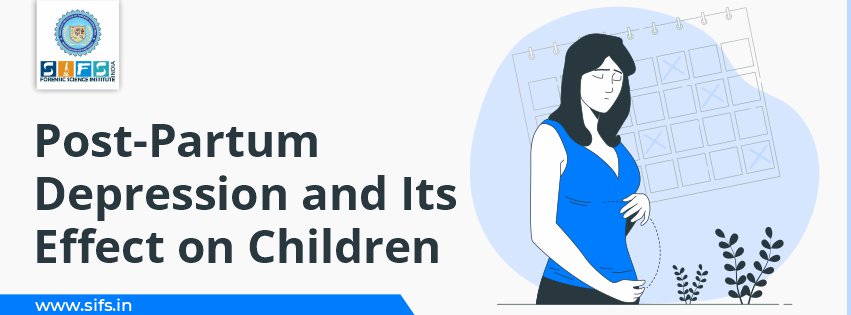- Call Us: +91 7303913002
- Email Us: education@sifs.in
Post-Partum Depression and Its Effect on Children

BY SIFS India | June 02, 2024
Post-Partum Depression and Its Effect on Children
Depression is a very common but serious mental illness that affects the A, B, C components of an individual; namely the affective, behavioral, and cognitive components.
Often, people suffering from depression might experience a feeling of hopelessness, loss of appetite, disinterest in activities they generally enjoyed, frustration, and sometimes irritability. In various studies, it has been found that women are more predisposed to developing depression.
This happens because the hormones in women tend to fluctuate too much during puberty, before menstruation, during pregnancy, postpartum, and perimenopause.
Today, we are going to focus on postpartum depression which has been still less talked about. Almost 6% of the women experience depression and almost 10% of women experience depression during and after their pregnancy.
Most of the time, depression after pregnancy is confused with “baby blues”. This isn’t the case and more and more people are falling prey to postpartum depression.
Post-Partum Depression Baby Blues
The ‘baby blues’ are the mildest form of postpartum depression wherein women might feel anxious one second and happy another. It is very common and is experienced by 80% of new mothers.
13% of women experience postpartum depression which is a much more serious condition, wherein the mother might have trouble sleeping, might want to be away from the child, might experience hopelessness, might become sad, might feel disinterest, and might even feel overwhelmed.
The fact which needs to be remembered over and over again here is, women who experience depression before their pregnancy, or have experienced depression at some point in their life might be more vulnerable to developing postpartum depression, that’s why depression needs to be treated before it starts affecting the infant who is still learning to explore the world with his/ her mother.
A woman who is suffering from depression during her pregnancy would have a disastrous effect on the health of the infant which is growing inside her. It would reflect in her eating habits, her mood patterns, and her thought processes.
Further, this depression wouldn’t limit itself till pregnancy. This would further develop into postpartum depression and would start affecting a healthy relationship between an infant and his/her mother.
How Does a Woman’s Depression Affect Her Children?
Mothers who are suffering from depression often have a very hard time being consistent with their children.
This inconsistency of being for being there for the child one minute and being withdrawn the very next often creates a hurdle between a smooth relationship between a child and her mother.
Often, children like these end up becoming very insecure.
Effects of Mother's or Caregiver's Depression on Children With Various Age Groups
Babies
Babies form a deep attachment with their caregivers (often mothers).
A healthy attachment between the mother and the infant develops when the mother responds consistently to her baby’s needs. Be it rocking, cuddling, consoling, and talking softly.
The mother lays down the foundation for a secure attachment with the baby.
If this attachment is inconsistent and the mother is often unavailable to cater to the needs of her infant, insecurity becomes deeply rooted in the infant and further this is seen in the later stages of their lives.
Babies who don’t develop a secure attachment with their mother often become very withdrawn, passive and often develop skills later than other babies.
Toddlers and Pre-Schoolers
Toddlers and Pre-schoolers who grow up with their mothers who are suffering from depression are less independent, often have destructive and aggressive behaviour, are less likely to interact with other people, and do not do well in their school.
School-Going Children
School-going children have behavioral issues, anger issues might develop attention-deficit hyperactivity disorder, might even fall prey to mental health disorders like anxiety and depression.
Adolescents
Adolescents whose mothers suffer from depression are at high risk for several problems including major depression, anxiety disorder, conduct disorder, substance abuse, attention deficit, and hyperactivity disorder, and learning difficulties.
Methods to Treat Depression
Depression though devastates many families when left untreated but it is quite treatable and could be treated by various treatments which have been listed below: -
- Medication: The drugs used most often to treat depression are called tricyclic antidepressants and SSRIs (selective serotonin reuptake inhibitors).
- Individual therapy: Talking with a psychologist, psychiatrist, or other professional.
- Family therapy: It involves others in the family, like a partner or children. This may be helpful when children are older.
- Social support: Such as community services or parenting education.
Thus, even though the fight against depression might seem like a dead-end but there is always a silver lining if handled with care.
Written by: Bhavika Tahiliani
References

